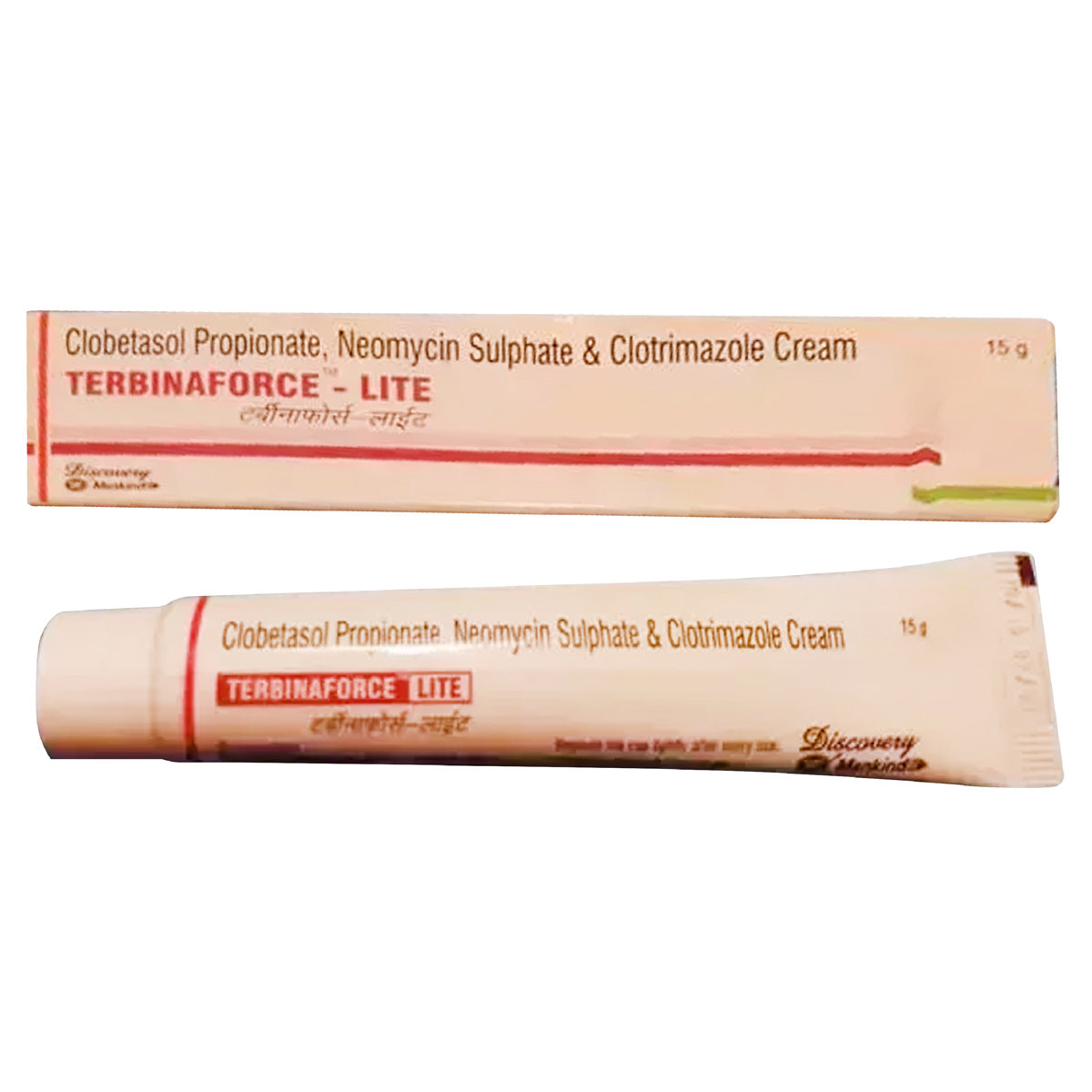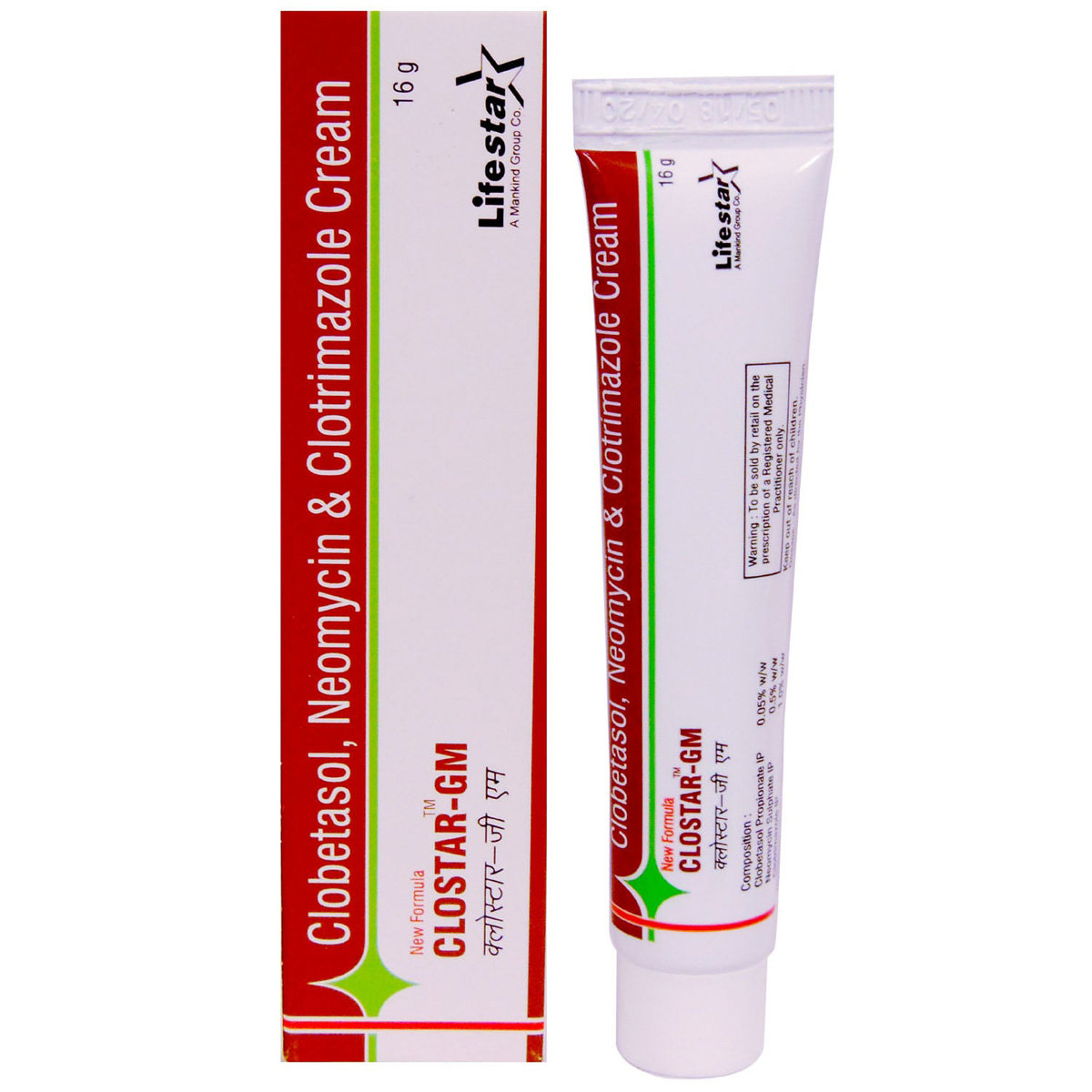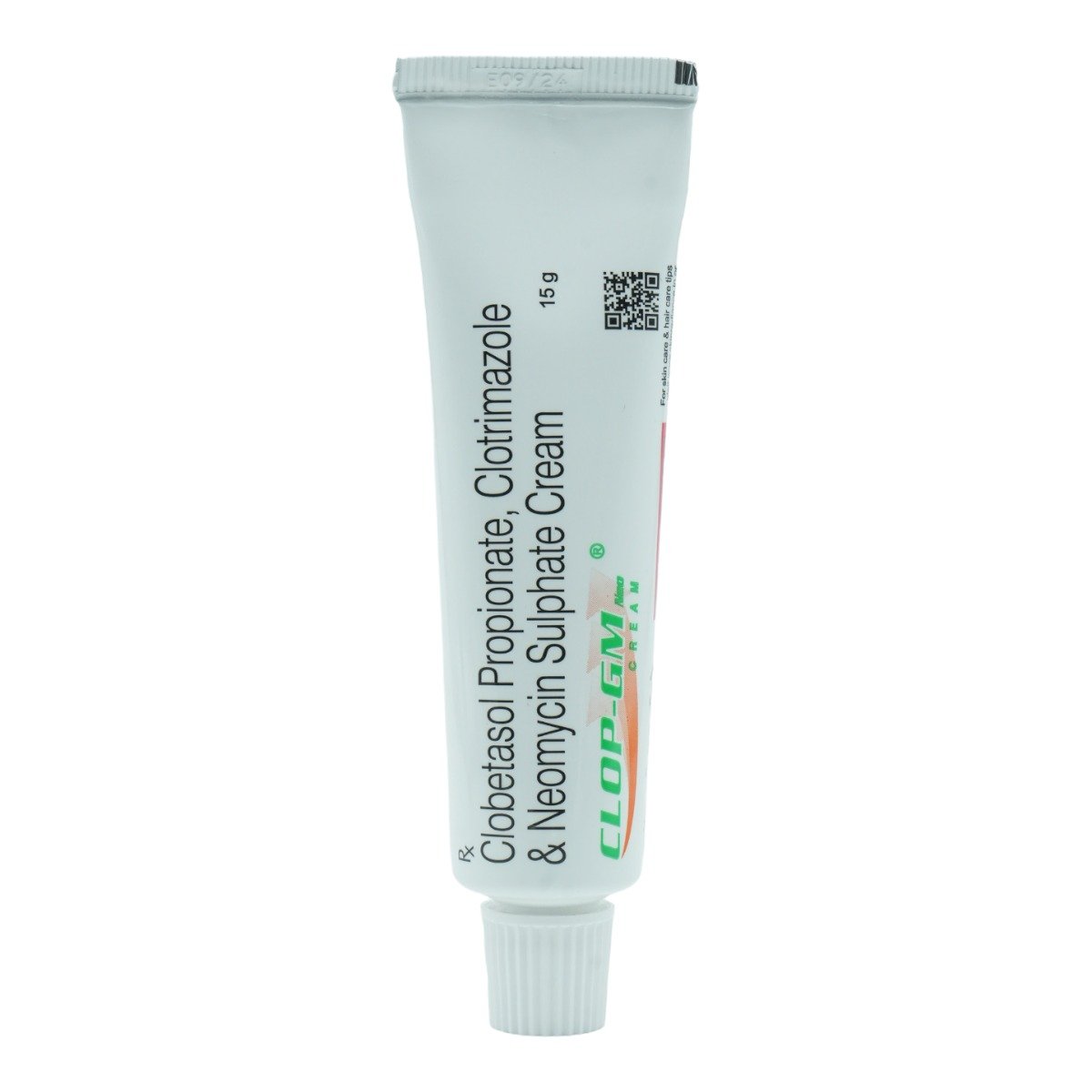Clojohn-GM Cream


MRP ₹34.04
(Inclusive of all Taxes)
₹5.1 Cashback (15%)
Provide Delivery Location
Online payment accepted
 Prescription drug
Prescription drugWhats That
Manufacturer/Marketer :
Consume Type :
Return Policy :
About Clojohn-GM Cream
Clojohn-GM Cream belongs to a class of dermatological medication ‘Topical Anti-Infectives with Corticosteroids’ used to treat fungal and bacterial infections of the skin. Also, Clojohn-GM Cream helps to reduce swelling, itching, and redness caused due to certain skin problems. Fungal infection can affect our skin and cause infection, which may be contagious (spread from one person to another). Bacterial infection is a condition in which harmful bacteria grow in the body and cause infection, thereby infecting any part of the body.
Clojohn-GM Cream is a combination of three drugs, namely: Clobetasol (corticosteroid), Clotrimazole (antifungal), and Neomycin (antibacterial). Clobetasol belongs to the class of corticosteroids that works by acting inside skin cells and inhibits the release of certain chemical messengers in the body that cause redness, itching, and swelling. When the skin reacts to any allergens, such chemicals are released normally. The fungal cell membranes are essential for their survival as they prevent the entry of unwanted substances into the cells and stop the leakage of cell contents. Clotrimazole belongs to the class of antifungals that works by causing holes in the fungal cell membranes and kills fungi. Neomycin belongs to the class of antibacterial that works by inhibiting the production of essential proteins required for bacteria to grow, multiply and increase in numbers, thereby destroying the bacteria.
Clojohn-GM Cream is only for external use. Use Clojohn-GM Cream as prescribed. by the doctor. Avoid contact of Clojohn-GM Cream with nose, ears, mouth, or eyes. In case Clojohn-GM Cream comes in contact with these areas accidentally, rinse with water thoroughly. Some people may experience dry skin, acne, thinning of the skin, itching, pain, swelling, redness, irritation, or burning sensation at the site of application. Most of these side effects of Clojohn-GM Cream do not require medical attention and gradually resolve over time. However, if the side effects worsen or persist, please consult your doctor.
If you are allergic to Clojohn-GM Cream or any other medicines, please tell your doctor. Avoid using Clojohn-GM Cream for more than 5 days in children and on the face. If you are pregnant or a breastfeeding mother, it is advised to consult a doctor before using Clojohn-GM Cream. Clojohn-GM Cream is not recommended for children below 2 years of age as the safety and effectiveness were not established. Avoid using Clojohn-GM Cream on open wounds, or damaged or broken skin. Do not wrap or cover the treated area with airtight dressings unless advised by a doctor. Avoid smoking or going near naked flames as Clojohn-GM Cream catches fire and burns easily. You are advised not to scratch or prick the infected areas of your skin as it may spread or worsen the acne. If you have rosacea (redness and often red, small, pus-filled bumps on the face), acne, perioral dermatitis (redness and swelling of the skin around the mouth), psoriasis, glaucoma, cataracts, diabetes, adrenal gland or liver problems, genital itching or other skin problems, inform your doctor before taking Clojohn-GM Cream.
Uses of Clojohn-GM Cream
Directions for Use
Medicinal Benefits
Clojohn-GM Cream is a combination of three drugs, namely: Clobetasol, Clotrimazole, and Neomycin used to treat fungal and bacterial infections of the skin. Clobetasol belongs to the class of corticosteroids that works by acting inside skin cells and inhibits the release of certain chemical messengers in the body that cause redness, itching, and swelling. When the skin reacts to any allergens, such chemicals are released normally. The fungal cell membranes are essential for their survival as they prevent the entry of unwanted substances into the cells and stop the leakage of cell contents. Clotrimazole is an antifungal that works by causing holes in the fungal cell membranes and kills fungi. Neomycin is a broad-spectrum antibiotic that acts against both gram-positive and gram-negative bacteria. It works by inhibiting the production of essential proteins that are necessary for bacteria to grow, multiply and increase in numbers. Thereby, destroys bacteria.
Storage
- Burning sensation is an abnormal side effect that needs medical attention. To relieve the burning feeling, your doctor may prescribe painkillers or antidepressants.
- Focused exercises can improve strength and reduce burning by soothing muscles.
- Change in lifestyle and improving nutrition can reduce the causes of burning sensation and provide relief.
- Your doctor may suggest nerve block injections as it is related to sensation in the skin.
- Burning feeling in a specific area would need mild electrical currents to reduce pain that targets the nerve affected. This practice must be done only if your doctor mentions it.
- If you experience burning or stinging sensations and suspect that they may be related to medication, consult a doctor or healthcare expert to determine the cause and best course of treatment.
- Avoid harsh products, extreme temperatures, and other potential irritants that may exacerbate burning or stinging.
- Your healthcare professional may recommend applying a soothing or protective agent, such as a cream, gel, or ointment, to help alleviate burning or stinging.
- Follow your healthcare professional's advice on how to care for the affected area, as gentle cleaning and care instructions may vary depending on the location and severity of the burning or stinging.
- Schedule follow-up appointments with your doctor to monitor your symptoms and adjust your treatment plan as needed. If the burning or irritation persists or worsens, seek medical attention.
Drug Warnings
Do not use Clojohn-GM Cream if you have inflammatory skin disorders infected with pseudomonas or proteus species of bacteria or viral skin infections like chickenpox, shingles, cold sores or herpes simplex, allergic to Clojohn-GM Cream or any other medicines, pregnant or a breastfeeding mother. Avoid using Clojohn-GM Cream for more than 5 days in children and on the face. Clojohn-GM Cream is not recommended for children below 2 years of age, as the safety and effectiveness were not established. Avoid using Clojohn-GM Cream on open wounds, or damaged or broken skin. Do not wrap or cover the treated area with airtight dressings unless advised by a doctor. Do not swallow Clojohn-GM Cream and in case of accidental swallowing, consult a doctor immediately. Avoid smoking or going near naked flames as Clojohn-GM Cream catches fire and burns easily. You are advised not to scratch or prick the infected areas of your skin as it may spread or worsen the acne. If you have rosacea (redness and often red, small, pus-filled bumps on the face), acne, perioral dermatitis (redness and swelling of the skin around the mouth), psoriasis, glaucoma, cataracts, diabetes, adrenal gland or liver problems, genital itching or other skin problems, inform your doctor before taking Clojohn-GM Cream.
Drug-Drug Interactions
Drug-Drug Interactions
Login/Sign Up
Drug-Food Interactions
Drug-Food Interactions
Login/Sign Up
Diet & Lifestyle Advise
- Regularly change your socks and wash your feet. Avoid shoes that make your feet sweaty and hot.
- In wet places such as changing rooms and gym showers, don’t walk barefoot. Wear flip-flops or sandals to prevent fungal infections.
- Do not scratch the affected area of the skin as it can spread the infection to other body parts.
- Avoid sharing towels, combs, bedsheets, shoes, or socks with others to prevent the spread of infection.
- Wash your bed sheets and towels regularly.
- Eat foods rich in quercetin (a flavonoid) such as apples, cherries, broccoli, spinach, and blueberries.
- Consuming food rich in probiotics helps in developing the immune system against allergies.
- Limit intake of food that might trigger allergies such as dairy products, soy, eggs, and nuts.
- Avoid consumption of foods with excess sugar as it may flare up inflammation.
- Include fruits, vegetables, whole grains, healthy fats, and fish in your diet.
- Avoid getting in contact with harsh soaps, detergents, and rough fabrics.
Side Effects of Clojohn-GM Cream
- Dry skin
- Acne
- Thinning of the skin
- Itching, pain, swelling, redness, irritation or burning sensation at the site of application
Habit Forming
Therapeutic Class
Product Substitutes
Author Details
We provide you with authentic, trustworthy and relevant information
Drug-Diseases Interactions
Drug-Diseases Interactions
Login/Sign Up
FAQs
Clojohn-GM Cream contains Clobetasol, Clotrimazole and Neomycin. Clobetasol is a corticosteroid that works by acting inside skin cells and inhibits the release of certain chemical messengers in the body that cause redness, itching and swelling. When the skin reacts to any allergens, such chemicals are released normally. The fungal cell membranes are essential for their survival as they prevent the entry of unwanted substances into the cells and stops the leakage of cell contents. Clotrimazole is an antifungal that works by causing holes in the fungal cell membranes and kills fungi. Neomycin is an antibiotic that works by inhibiting the production of essential proteins that are necessary for bacteria to grow, multiply and increase in numbers. Thereby, destroys bacteria.
Yes, Clojohn-GM Cream may cause skin itching at the site of application as a temporary side effect. However, if the itching persists or worsens, please consult a doctor.
You are recommended to cover the treated area of skin with bandages or dressings only if advised by your doctor else it may increase the risk of side effects.
No, Clojohn-GM Cream is not recommended to treat acne as it may worsen the condition. Clojohn-GM Cream is only used to reduce itching, swelling and redness caused due to certain skin infections. However, please consult a doctor before using Clojohn-GM Cream.
You are recommended to use Clojohn-GM Cream for as long as your doctor has prescribed it. However, if the condition persists or worsen after 2 to 4 weeks of treatment with Clojohn-GM Cream, please consult a doctor.
Yes, Clojohn-GM Cream may cause dryness of the skin. You can use a moisturizer while using Clojohn-GM Cream to prevent dry skin. However, do not apply Clojohn-GM Cream and moisturizer at the same time as it may reduce the effectiveness of Clojohn-GM Cream. Please consult a doctor before using other products with Clojohn-GM Cream.
Yes, fungal infection is a contagious skin condition which spreads from one person to another through direct skin to skin contact or by contact with contaminated soil or surfaces and infected animals. Therefore, it is recommended to avoid close direct contact until the infection is clear and avoid sharing things with the infected person as it can also spread the infection.
No, you are not recommended to stop using Clojohn-GM Cream without consulting your doctor as it may worsen the condition or cause recurring infection. Therefore, take Clojohn-GM Cream for as long as your doctor has prescribed it, and if you experience any difficulty while taking Clojohn-GM Cream, please consult your doctor.
Drug-Drug Interactions Checker List
- ITRACONAZOLE
- RITONAVIR
Special Advise
Please consult a dermatologist if your skin infection persists for more than 1 month.
Disease/Condition Glossary
Fungal infection: It is a skin disease in which a fungus attacks the tissue and cause infection. Fungal infections may be contagious (spread from one person to another). The symptoms of a fungal infection include scaly skin, blisters, itching, swelling, irritation, and redness. Antifungal medicines are usually used to treat fungal infections. Bacterial infection is a condition in which harmful bacteria grow in the body and cause infection. It can target any part of the body and multiply very quickly. Bacteria come in three basic shapes, namely spherical, rod, or spiral-shaped. Bacteria may be gram-positive (have thick cell walls) or gram-negative (do not have cell walls). Appropriate tests are done to identify bacterial strains, and based on the results, proper medication is prescribed. Some common symptoms of bacterial infection include cough, fever, and tiredness.

Have a query?
Alcohol
Caution
Interaction of Clojohn-GM Cream with alcohol is unknown. Please consult a doctor before consuming alcohol while using Clojohn-GM Cream.
Pregnancy
Caution
The safety of Clojohn-GM Cream in pregnant women is unknown. However, neomycin present in Clojohn-GM Cream crosses the placenta and may harm an unborn baby. So it is not recommended for use in pregnant women.
Breast Feeding
Caution
It is unknown whether Clojohn-GM Cream is excreted in human milk. It is given to breastfeeding mothers only if the doctor thinks benefits are greater than risks.
Driving
Safe if prescribed
Clojohn-GM Cream usually does not affect your ability to drive or operate machinery.
Liver
Caution
If you have any concerns regarding the use of Clojohn-GM Cream in patients with Liver problems, please consult a doctor.
Kidney
Safe if prescribed
If you have any concerns regarding the use of Clojohn-GM Cream in patients with Kidney problems, please consult a doctor.
Children
Caution
Clojohn-GM Cream is not recommended for children below 2 years. However, in children above 2 years, it should be used with caution and in doses only as prescribed by a doctor.











